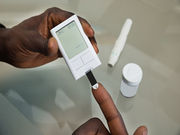Improved HbA1c reduction versus placebo in older patients uncontrolled on current medications
WEDNESDAY, Feb. 15, 2017 (HealthDay News) — Lixisenatide is more effective than placebo for older patients with uncontrolled diabetes on their current medication, with no unexpected safety findings, according to a study published online Feb. 10 in Diabetes Care.
Graydon S. Meneilly, M.D., from the University of British Columbia in Vancouver, Canada, and colleagues conducted a phase III trial involving 350 patients aged ≥70 years who were randomized to once-daily lixisenatide or placebo before breakfast concomitantly with their existing medication (including insulin) for 24 weeks. The absolute change in hemoglobin A1c (HbA1c) was assessed from baseline to week 24 as the primary end point.
The researchers found that, from baseline to week 24, there was a significant decrease in HbA1c with lixisenatide versus placebo (−0.57 versus +0.06 percent; P < 0.0001). Lixisenatide correlated with a significantly greater mean reduction in two-hour postprandial plasma glucose versus placebo (−5.12 versus −0.07 mmol/L; P < 0.0001). There was also a significantly greater decrease in body weight with lixisenatide versus placebo (−1.47 versus −0.16 kg; P < 0.0001). The safety profile of lixisenatide in this population was consistent with that seen in other studies, including rates of nausea and vomiting. Hypoglycemia was reported in 17.6 and 10.3 percent of patients taking lixisenatide and placebo, respectively.
“In non-frail older patients uncontrolled on their current antidiabetic treatment, lixisenatide was superior to placebo in HbA1c reduction and in targeting postprandial hyperglycemia, with no unexpected safety findings,” the authors write.
Several authors disclosed financial ties to pharmaceutical companies, including Sanofi, which manufactures lixisenatide and funded the trial.
Full Text (subscription or payment may be required)
Copyright © 2017 HealthDay. All rights reserved.








